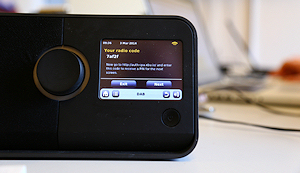
After six months of close collaboration, the EBU Cross Platform Authentication group (CPA), has finalised its first draft specification: CPA v0.1. It addresses how to associate a media device with limited input capabilities (e.g. a radio) with an online account. The specification is unique in the sense that it approaches device personalisation from the hardware side.
Out of the box
Guaranteeing out-of-the-box operation is an important requirement from manufacturers. With CPA a user can immediately start using the device and only later create an online account to go with it, for example to enjoy personalisation of content across different media devices.
CPA can operate in three different modes: anonymous, device and user. These simple modes hide a series of complex background interactions with service and authentication providers, some of which are still being worked on in the CPA group.
Practical example: a DAB radio displaying a CPA code.
Agile standardisation
The EBU CPA Group is composed of mainly software engineers, who quickly agreed to use development techniques proven in the Open Source community, with the aim of simplifying collaboration and minimising 'paperwork'. These 'agile practices' include the use of:
- text as the file format for each document, kept in Git;
- Pandoc's Markdown and PlantUML for document and image versioning;
- Github for issues tracking and integration between spec and reference implementation;
- Jenkins to run implementation tests and generate documentation;
In terms of management, a core group of people is taking care of writing the specification and keeping the reference implementation up to date. Meetings are efficient as they focus on unresolved issues listed in Github, using milestones to structure the discussion based on the version of the document. The results of discussions are captured directly in the issue tracker which thus also provides a history of the decisions. The minutes of the meeting consist of a bunch of closed issues. The CPA approach could be an example for other EBU groups, especially since the output is not limited to the specification alone; the reference impementation and integration tests can easily be transformed into an online service for testing interoperability.
More information on CPA is available via: Michael Barroco (EBU).

